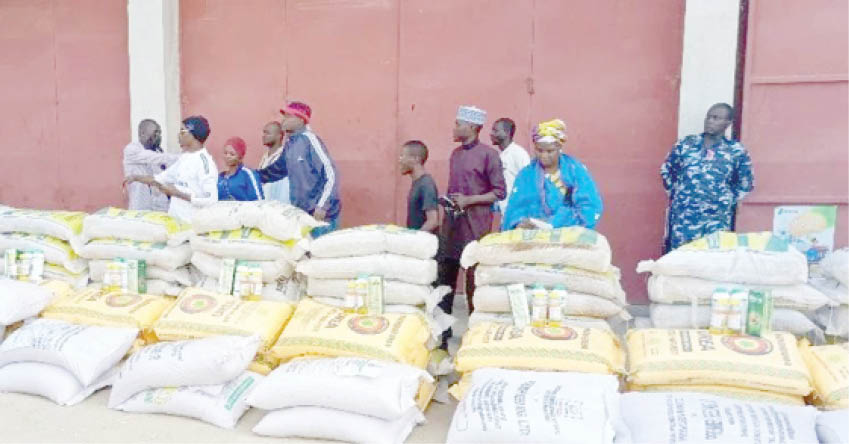The Federal Ministry of Agriculture and Food Security launched the 2023/2024 dry season wheat farming under the National Agricultural Growth Scheme and Agro Pocket (NAGS-AP) initiative in November last year, with a projected yield of 1.2 million metric tonnes of wheat each year.
As part of the program, the Federal Government intends to provide 50 percent input subsidies to about 150,000 to 250,000 farmers in order to cultivate 200,000 to 250,000 hectares with a projected wheat yield of 1.2 million tons.
The Minister of Agriculture and Food Security, Sen. Abubakar Kyari, at the flag off ceremony in Jigawa, revealed that “the dry season farming programme was “made possible by a $134 million loan facility advanced to Nigeria by the African Development Bank (AfDB) and encapsulates this administration’s resolve to expand the capacity of our farmers to engage in the cultivation of key staples like rice, maize, cassava and wheat, across the country.”
Allegations of round-tripping, in which farmers take inputs and sell them to agro-dealers instead of using them for production, were made public a month after the program began. Furthermore, there have been documented instances of inadequate verification of farmers’ data, resulting in the removal of legitimate wheat growers.
- Kogi to legalise free payment of external, internal exam fees
- Kaduna police hand over Abuja ‘kidnap kingpin’ to FCT Command
Stakeholders expressed concern over these practices because they would be vulnerable to systemic corruption, which would undermine their success.
During a recent meeting with Abiodun Abayomi Oyebanji, the governor of Ekiti State, the agric minister acknowledged the existence of corruption issues related to farmers being enticed by agro dealers and poor farmers’ data.
“These challenges include reported cases of round-tripping in connivance with agro-dealers and poor validation of farmers’ data in parts of the participating states,” Kyari said, adding that “as we look forward, it is imperative for us to tackle some of the challenges observed during the ongoing Wheat Dry Season Farming in the 15 participating states, avoid re-occurrence in the second phase for Rice, Maize and Cassava and ensure that they do not impede our agricultural development agenda.
“We are dedicated to implementing stringent measures in the forthcoming Dry/Wet Season Farming for rice, maize, and cassava, to ensure transparent distribution and target genuine farmers. Collaboration with states, local governments, traditional rulers, local farmers’ associations, NGOs and relevant MDAs will be crucial in achieving the desired objectives,” he stated.
According to sources from Niger and Yobe states, many farmers – especially those without a history of growing wheat – sold the input they received via the program to agro-dealers and used the proceeds for purposes other than growing wheat – a development the ministry is aware of.
In an effort to halt the scenario and prevent a recurrence for the second phase of the plan, which focuses on rice, maize, and cassava, the ministry convened a meeting with the key stakeholders in the sector to examine the way forward.
The meeting was attended by the Minister of Finance and Coordinating Minister of Economy, Mr Wale Edun, and Minister of Budget and Economic Planning, Alhaji Atiku Bagudu. The Minister of Agriculture and Food Security, Sen. Abubakar Kyari, stated that the objective of the forum was to review the implementation of the 2023/2024 dry season wheat production and to chart a new course for the implementation of the second phase for rice, maize and cassava.
Sen. Abubakar Kyari stated that the project aside supporting farmers with critical farm inputs for the production of the priority crops will also provide institutional support for better performances and sustainability particularly in the areas of wheat seeds local production.
FG turns to ICT as solution
The minister is taking a different tact when it comes to the problems, hoping to assign officers to oversee and coordinate the supply chain operations and strictly follow the established guidelines and regulations. However, this could prove challenging because some of the collusion is carried out with knowledge of ministry officials.
“The ICT platform provider are to deploy the best and reliable system that can capture and trace all the transactions under the agro-pocket, being the primary purpose government decided to utilize technology in the inputs delivery process to promote transparency, accountability and easy tracking of the impacts and performance,” Kyari said.
Senator Kyari is also focusing on the input producers to ensure that the fertilizers, seeds, agro-chemicals supply meet with the prescribed set standards in terms of quantity and quality, the input distributors or agro-dealers to sell only certified and approved products sourced from the registered input producers.
The Minister of Finance, Mr. Wale Edu, who attended the meeting, stated that “there is a substantial intervention fund for the agric sector, in terms of food production, to produce more rice, maize wheat and cassava. It will help to bring down rate of inflation. Successful dry season farming will bring down cost of food production and will bring down inflation.”
The Minister of Budget and Economic Planning, Alhaji Atiku Bagudu, also said “Nigeria’s agricultural space is one of the most elastic in the world. Every cropping season can produce a miracle, if there is more investment in the sector.”
Bagudu added that the present administration is committed to the agriculture sector in terms of improvement in budget allocation and other intervention funds to achieve food and nutrition security.

 Join Daily Trust WhatsApp Community For Quick Access To News and Happenings Around You.
Join Daily Trust WhatsApp Community For Quick Access To News and Happenings Around You.